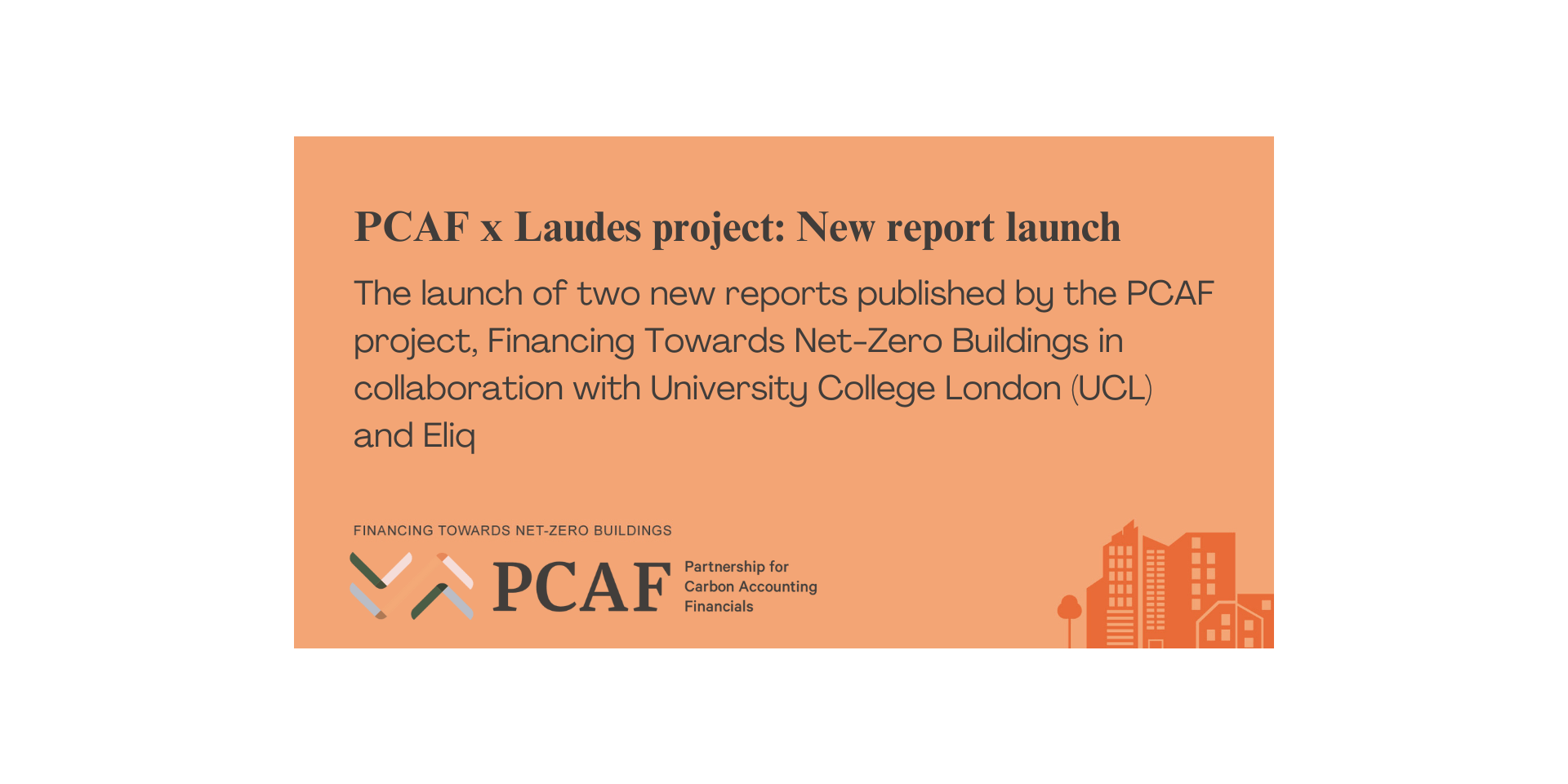
Utrecht, the Netherlands – 27th June 2024: Today PCAF announces the launch of two reports examining techniques for measuring actual building emissions. These were compiled in collaboration with Eliq, a Gothenburg-based software company specializing in home energy efficiency, and the Smart Energy Research Lab (SERL) at the world-renowned educational institution University College London (UCL).
Funded by the Laudes Foundation, the PCAF project “Financing towards net-zero buildings" commenced in July 2021, with the aim of mobilizing financial institutions (FIs) to accelerate the transition of European buildings towards net-zero.
Actual emissions measurement will provide FIs with emissions data more precise than calculations based on emission datasets. The real-time nature of such methods contribute to this precision, avoiding temporal variations that impact conventional calculations.
The two new reports highlight the importance of leveraging this data, recommending that FIs utilize actual emissions measurement data obtained from innovative modelling techniques to enable more accurate greenhouse gas (GHG) emissions measurement. They also recommend several co-benefits of such data, including enhancing the efficacy of sustainable finance products.
Eliq and UCL stress that collaboration is key to accessing high-quality contextualized energy data with UCL highlighting the importance of relationships with academia and technology providers while Eliq emphasizes the advantage of leveraging B2B collaboration with energy data management platform providers. Initial industry collaborations on this topic with FIs have resulted in data-related insights leading to impactful action.
Tadj Oreszczyn, Director UCL Energy Institute, comments, “We cannot manage current and future carbon emissions if we do not measure them. Historically this was difficult and expensive but the advent of smart meters and other IoT devices has revolutionized our ability to measure energy use. Financial institutions have a key role to play in helping to decarbonize our energy system, but have placed an overreliance on modelled building energy performance via Energy Performance Certificates. Now is the time to improve the quality of what we do using the best available data.
Will Ephraim, Head of Business Development at Eliq, comments, “Accurate energy data is crucial for the success of the energy transition. We are proud to collaborate with PCAF, committing to provide the highest quality data that will drive meaningful change and support a sustainable future."
Nagadarsan Suresh, Project Manager of PCAF's 'Financing towards net-zero buildings', adds, “In Europe, buildings account for more than a third (37%) of GHG emissions. In order to meet the Paris agreement and reach net-zero emissions by 2050, FIs need access to clear guidance on accelerating the European building stock transition. Collaboration is key to reaching a net-zero economy, and methods similar to those employed by UCL and Eliq could empower FIs to track their progress more accurately. Based on the results of this work, we will further explore the integration of actual emissions measurement into PCAF.”
The full findings from both reports can be found here:
Download Pilot Study: Collaboration of Financial Institutions with Academia and Utilities
ENDS
About UCL SERL
SERL collects household level data as part of a nationally representative Observatory sample, and as part of laboratories that consist of homes which have had a specific intervention, such as a specific technology or policy. The SERL observatory dataset includes 13,000 homes, representative of Great Britain’s (GB) population of homes where half hourly gas and electricity data have been monitored since 2019 and linked to tariff data, weather data, Energy Performance Certificates (EPC) data and qualitative survey data to reflect actual energy measurements offering more accurate energy performance estimates of buildings in real-life use compared to normative predictions from EPCs
About Eliq
Eliq, a Gothenburg-based software company specializing in home energy efficiency, strives to be the chosen partner of innovative utilities to help them transform from supplying energy as a commodity to becoming digital businesses, offering energy efficiency and optimization as a service. As a commercial data management system service provider, Eliq deploys a nearest neighbor model to reflect actual measurements for their clients.
About the Partnership for Carbon Accounting Financials
The Partnership for Carbon Accounting Financials (PCAF) was launched globally in September 2019. Currently, more than 450 financial institutions have subscribed to the PCAF initiative. PCAF signatories work together to jointly develop the Global GHG Accounting and Reporting Standard for the Financial Industry to measure and disclose the greenhouse gas emissions associated with portfolios of loans, investments, provision of insurance, and other financial products and services. By doing so, PCAF signatories take an important step to assess climate-related risks, set targets in line with the Paris Climate Agreement and develop effective strategies to decarbonize our society.